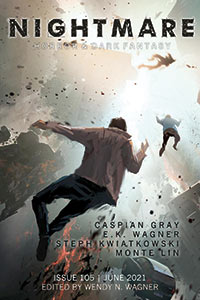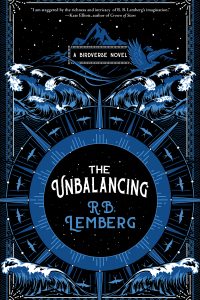Russell Letson Reviews Lockdown Tales II by Neal Asher
 Lockdown Tales II, Neal Asher (NewCon 978-1-914953-43-9, £13.99, tp; £29.99, hc, 372 pp) July 2023. Cover by Vincent Sammy.
Lockdown Tales II, Neal Asher (NewCon 978-1-914953-43-9, £13.99, tp; £29.99, hc, 372 pp) July 2023. Cover by Vincent Sammy.
Lockdown Tales II is Asher’s second collection of shorter pieces written since COVID prompted the titular restrictions. Of the nine stories (produced between 2020 and 2023), four are new to this volume; three are of novella length; and seven are set in the Polity future history. (Note: These categories overlap.) I am struck by how much personal revelation is included – biographically, thematically, and to a degree politically – in the Introduction, the headnotes, and, less directly, the stories themselves. An early hint comes in a grumpy comment early in the Introduction about lockdowns and politicians that suggests some political-cultural vector. The Polity-setting stories concern farther-off issues and anxieties that may be as revealing as any explicit grumping.
Motifs from War Bodies run through the whole collection, especially transformation and uplifting and the super/post-human condition. The opening novella, “Xenovore”, evokes the strongest echoes of the novel in its close-up, subjective account of the growth of more-than-human abilities in the midst of a is running experiments on a group of captured Polity humans, altering their physical and mental traits and testing them to destruction in an intensely predator-rich planetary environment. The story’s atmosphere owes more than a little to both the physical and psychological sides of the horror genre: the opening description of a xenovore attack made me reluctant to continue, and the protagonist’s memories and understandings are an unreliable, nightmarish jumble. The horror atmosphere shifts to a more familiar Asherian pattern as the protagonist, Anstor, and then his fellow prisoners, begin to get control of the changes and powers installed by the Nok and start to wage war on their tormentor. Anstor, like Piper in War Bodies, worries about his actions as potentially the absolute controller of the other prisoners in the fight with the Nok and its forces: “If he kept them so utterly subject to his will they would simply be resources to throw against the Nok… slaves and not compatriots…. If he sacrificed his control over them… he sacrificed that power.”
Some of the prisoners’ powers are science fiction’s traditional Wild Talents – telepathy, teleportation, levitation – which, Asher explains in a headnote, he has previously avoided because he saw psychic powers as “simply magic” and a “copout.” Here they are eventually accounted for in (quite speculative) materialist terms. It may be significant that at the story’s end, the uplifted characters realize that there is no place for them in the Polity (“Do you think the AIs will allow us to return to our old lives?”), a practical decision that also applies to a Polity storytelling space that would have to accommodate them and their superpowers.
Asher returns to the development-of-a-superman trope from a different angle in the linked trio of “Translator,” “Host,” and “Moral Biology,” this time via the merging of an alien-biotechnological entity with a linguistic specialist. In “The Translator,” an aquatic “shroud skate” attaches itself to linguistic expert Perrault and proves to be more than just an ordinary predator when Perrault’s senses sharpen, eventually leading to a kind of pansensory synaesthesia that also integrates data of all kinds, starting with his linguistic abilities: “I gazed at the tangled masses of stalks and fronds and began to see letters, glyphs, and pictographs from the many languages I knew. There had to be meaning here…. I began integrating them all, tracing out fragments of meaning….” And when his new understanding expands sufficiently, he figures out why he wound up where he did and the role of Polity AIs in his situation.
“The Host” is the middle section of this sequence, though written first and featuring a different central character. Ivebek Cloon is a very bad man who the Polity decides to study and use rather than execute, because he has been altered by an encounter with an alien: “as well as the usual physical ruggedness, he was no longer a killer – [he] possessed empathy.” The Polity, unsurprisingly, is curious about an entity that can so transform a person and allows Ivebek to be drawn to a meeting with it, conversing, along the way, on large matters, including how “our base desires [are] written into our genomes… but we build structures on top of them with our intelligence, and call them purpose.” When Ivebek finally confronts the being he has been talking to, there’s a payoff that Philip José Farmer might have approved of (because he anticipated something like it a half-century ago).
“Moral Biology,” the novella-length completion of the trio, returns to Perrault, now part of a team investigating a world surrounded by ancient-alien weapons systems somehow connected to structures and life forms on the planet below. The storyline is familiar – a trek through a dangerous, predator-filled environment, unpacking puzzles along the way, with Perrault using his shroud-boosted linguistic abilities to decode and ultimately communicate with the planet’s intelligent inhabitant. Perhaps the story’s thematically crucial line is delivered by Perrault – not, it is noted, the first time he has used it: “We are meat machines transporting slow genes into the future, while looking at the stars.”
“Eels” follows another Polity-engineered takedown of a planetary bad guy, a cousin story to “Monitor Logan” in the first Lockdown volume. Souped-up Polity agent Roland drops onto a world whose major feature is a “world tide” that periodically inundates everything and where the adapted colonists have gills as well as lungs and spend half their time underwater, riding gigantic, maybe-sentient eels. Roland makes contact with the local leadership, falls hard for the boss’s daughter, and organizes a familiar campaign against the bio-engineering villain. There’s an odder, older unacknowledged distant cousin lurking in “Eels”, though: at one point I also found myself thinking, “Barsoom!”, complete with a Dejah Thoris to Roland’s John Carter and a four-armed villain who is a dead ringer for a green Martian.
Asher’s headnote to “Skin” reports that the circumstances of the story’s commissioning was an opportunity to “let rip with some Polity weirdness,” which in this case is another account of a transformation, as a woman purchases an ultra-sensory “octoskin” enhancement that comes with buyer-beware warnings to which she should have paid more attention. Again, the story heads into horror territory as the true nature of the new skin manifests itself, but the materiality of the Polity’s miraculous technology remains clear:
She saw thousands upon thousands of needles penetrating her skin, small reels of computing substrate unwinding and sliding in… sensory beads like metal dust emptying from globular containers as injectors like sewing machine needles punched them into her skin. Larger transparent needles injected fluids – synthetic blood and plasma, colorful hydrogels holding glints of nanowire.
“Antique Battlefields” is set in the early stages of the pre-Polity Quiet War that ushered in the era of AI rule and follows the planned-for transformation by a secret immortal who is concealing himself via the same technique used by the Howard Families in Heinlein’s Methuselah’s Children: the Masquerade technique of faking one’s death and taking up a new, younger identity. (Asher name-checks Highlander, but the idea is older than that.) Voigt’s naturally occurring longevity is being replicated by advancing medical technology (which is an ancestor of the Polity’s nanosuites), but more interesting (at least to a longtime follower of this future history) are his reasons for remaining in hiding: his mistrust of current official power structures, thanks to “how hand in glove, or rather pocket, were governments and corporations.” But Voigt has an inkling of the omnipresence of AI influence, a suspicion that gets validated in the course of his identity-shifting adventures.
The non-Polity “Longevity Averaging” is also about longevity, and another story that Asher marks as having an autobiographical element, with much of its age-extension technology based on his own research into life extension. (Also perhaps autobiographical: a big dose of contrarian/libertarian attitude echoing the Introduction’s grumping about lockdowns.) As a result, it is strongly procedural, specific, and explanatory (verging on the didactic), a kind of extrapolative recipe for rejuvenation. More interesting, science fictionally, than the enabling machineries behind longevity are the story’s background features: civil unrest, anger, envy, and resentment aimed at those who can afford the treatments, and governmental foot-dragging on making them widely available. I am reminded again of Methuselah’s Children, with the long-lived Howard families persecuted and fleeing the anger of their short-lived fellow citizens, and returning to find that the non-existent secret immortality treatment has been discovered.
“An Alien on Crete” is a bit of an outlier, a first-contact story, set in the parts of present-day Crete where Asher lives half the year. Nevertheless, it does fit, in theme and motif, with the other pieces in the volume, though in a way that would set off the Spoiler Alarm to specify. What can be revealed, though, is that the visiting alien gives a glimpse of what humankind will see when they are able to see far enough Out There:
Probes, wrecked ships and their remains, pieces of space stations, orbital rings, space elevators and other detritus besides. Billions of years of the rise and fall of civilisations have liberally sprinkled the cosmos with these remains…. [Y]our astronomers… will be surprised and perhaps appalled at what they find.
Sounds like the kind of galaxy inhabited by the Polity (and the Culture), a jumble of living civilizations and a palimpsest of vanished ones, at once a jungle and a crowded neighborhood. Which is not a bad passage with which to end this review.
Russell Letson, Contributing Editor, is a not-quite-retired freelance writer living in St. Cloud MN. He has been loitering around the SF world since childhood and been writing about it since his long-ago grad school days. In between, he published a good bit of business-technology and music journalism. He is still working on a book about Hawaiian slack key guitar.
This review and more like it in the October 2023 issue of Locus.
 While you are here, please take a moment to support Locus with a one-time or recurring donation. We rely on reader donations to keep the magazine and site going, and would like to keep the site paywall free, but WE NEED YOUR FINANCIAL SUPPORT to continue quality coverage of the science fiction and fantasy field.
While you are here, please take a moment to support Locus with a one-time or recurring donation. We rely on reader donations to keep the magazine and site going, and would like to keep the site paywall free, but WE NEED YOUR FINANCIAL SUPPORT to continue quality coverage of the science fiction and fantasy field.
©Locus Magazine. Copyrighted material may not be republished without permission of LSFF.








